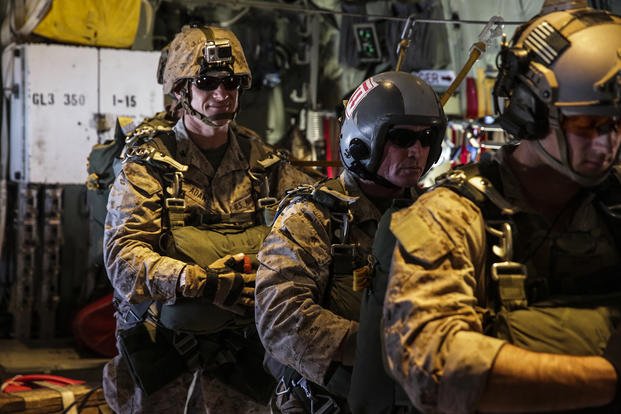After proving themselves in special operations through the Marine Special Operations Command Detachment One in 2003, a pilot program formed in response to a Special Operations need in Iraq and Afghanistan -- the MARSOC branch of Special Operations Command (SOCOM) -- was born. A decade ago, the need was met within the Special Operations community by adding MARSOC to SOCOM. Creating an "elite force within an elite force" always has been a tough sell for Marine Corps brass.
A decreased need for small amphibious operations disbanded the Marine Raiders after the War in the Pacific (1944), and not becoming part of SOCOM in the 1980s contributed to keeping the Marines out of the Joint Special Operations world until the events of Sept. 11, 2001. After 9-11, the mission changed again, and the need for more trained military members to engage in tactical direct action, foreign internal defense, counterterrorism, information warfare, human intelligence and special reconnaissance missions arose.
Creating an Identity
The MARSOC community has grown into a tight-knit family of combat veterans, seasoned special operators, highly intelligent support staff and operational savvy training staff. They have created a challenging pipeline for the experienced Marine to follow if they want to join the ranks of Marine Special Operations.
Just less than a year ago in 2014, the Marine commandant (Gen. Amos) announced that all units in MARSOC commands would undergo a name change. The Marine Raider moniker was brought back to give an identity to the Marines fighting as MARSOC. The term "Raider" is a fabled identity that honors and links World War II special operations Marines to today's MARSOC Raider.
Here are the positions within the MARSOC Raiders a Marine can be selected to join.
Critical Skills Operators
CSO's are the front-line Marines, sailors and officers who are complex problem solvers able to operate across a full spectrum of special operations in small teams in any environment while maintaining a high level of flexibility and physical endurance. These operators often train host nation military groups, gather information on the enemy and engage the enemy with lethal force when necessary. CSO's specialized training also allows for extended capabilities in language fluency that is necessary for crossing cultural barriers within foreign militaries and a civilian populace as well. As of 2011, the enlisted CSO's can stay in MARSOC for the length of their career if they choose. And as of 2014, officers in Marine Special Operations were approved as a military occupational specialty, or MOS, as well.
It takes at least 4.5 years to create a Marine CSO. To sign up for Raider Selection and Assessment, a Marine must have a minimum of three years (at least a corporal) in the Corps before they can consider MARSOC. The selection process begins with a seasoned Marine from any MOS.
Special Operations Capabilities Specialists
SOCS's are combat support Marines who are able to join MARSOC, using their original MOS, and receive advanced special operations training to be force multipliers. These billets include intelligence, communications, explosive ordnance disposal, dog handlers and fire control specialists.
Operations Combat Service Specialists
SOCS-S are combat service support Marines who serve a tour with MARSOC, such as motor transport or logistics. SOCS-S train for joint and interagency work missions and enhance their Special Operations Forces (SOF) combat skills to integrate and thrive in special ops environments successfully.
From an observation position outside the military and with daily communication to future military members, I see the rebranding of MARSOC as a genius move. Already, I have received countless emails coming in through Military.com from teenagers and young men saying they want to become a Marine Raider. MARSOC is looking for a mature special operator with experience who is smart and strong enough to teach and perform at a high level all over the world. But to become a Marine Raider, you have to excel at being a Marine first.
To answer the question of how to become a Raider, here is the pipeline to follow:
See a recruiter; join the Marine Corps. Since MARSOC takes from any MOS, pick an MOS you prefer. You can use RECON MOS (0321) as a steppingstone if you are a hard charger, but it is not necessary. Navy Corpsman can join as combat medics and receive advanced special operations medical training after training.
Marine Corps Boot Camp -- Parris Island, S.C., three months
School of Infantry (SOI) -- Every Marine is a rifleman. You will attend one of the two SOI branches:
Infantry Training Battalion (ITB) -- For all infantry Marines; the Infantry MOS number is 03xx.
Marine Combat Training (MCT) -- For all other MOS Marines
Assigned to your Permanent Duty Station (PDS). Here, you do your job -- stand out above the rest and make rank. Within three years, or the rank of corporal, you can start the selection process to become a MARSOC Raider.
Screening for CSO
Assessment & Selection -- Phase 1 is a three-week Assessment and Selection Preparatory and Orientation Course (ASPOC) that proceeds to the main selection phase. The Marines will be challenged both mentally and physically in this phase. You will learn about the requirements of being a MARSOC Raider and personally assess your desire to continue. Surviving assessment does not ensure your selection to attend the next phases.
Assessment & Selection -- Phase 2, A&S2 is a mentally and physically challenging evaluation that enables MARSOC to identify Marines who have certain attributes and a personality compatible with special operations missions.
Individual Training Course (ITC) -- The nine-month course centers on the skills necessary to develop a highly capable Marine special operator, which include direct action, close quarters battle, special reconnaissance, foreign internal defense, fire support, tactical casualty care, irregular warfare, survival evasion resistance, escape, and infantry weapons and tactics. Officers also will attend a four-week Team Commanders Course (TCC) after successful completion of ITC.
Training does not end here. Depending upon your deployment cycles, you may have time for many of these schools while serving in the Raider Battalion, such as the advanced linguist course, sniper school, combat dive school and many others.
MARSOC has evolved quickly into a formidable Special Operations community. The training pipeline is similar to that of the Army Special Forces with assessment, selections and qualification courses with similar length of time and education. It also holds very challenging water confidence skills and rucking requirements for both SEALs and Ranger training. If you are preparing for MARSOC, pre-training is required to stand out, but operational prowess is just as important throughout the training pipeline.
Stew Smith works as a presenter and is on the editorial board with the Tactical Strength and Conditioning program of the National Strength and Conditioning Association and is a Certified Strength and Conditioning Specialist (CSCS).
Want to Know More About the Military?
Be sure to get the latest news about the U.S. military, as well as critical info about how to join and all the benefits of service. Subscribe to Military.com and receive customized updates delivered straight to your inbox.












